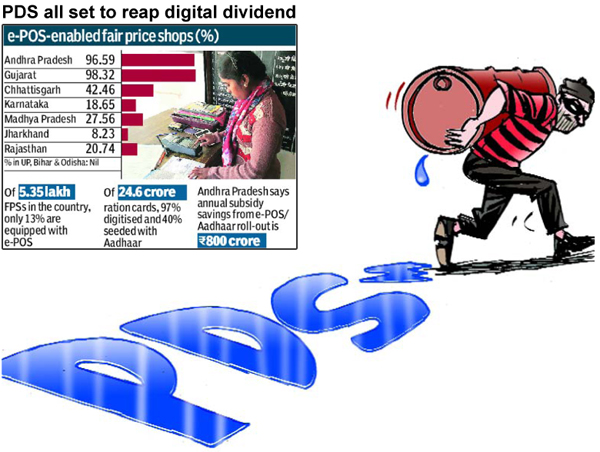PDS all set to reap digital dividend
With almost all ration cards in the country digitised and 40% seeded with Aadhaar, several states have now installed electronic point of sale (ePOS) devices at their fair price shops (FPSs). The ePOS devices that track the sale of foodgrains to actual cardholders on a realtime basis would complement the efforts to cut pilferage, allowing significant savings in food subsidy, even as the implementation of the direct benefit transfer (DBT) to credit the subsidy to the bank accounts of the intended beneficiaries is still at an early stage.
Gujarat and Andhra Pradesh have almost completed ePOS installations, while others like Chhattisgarh and Madhya Pradesh are catching up. States with large poor populations like Uttar Pradesh, Bihar and Odisha have, however, yet to make any headway in equipping their FPSs with ePOS devices

According to sources, Andhra Pradesh would save around R800 crore annually through steps like putting ePOS devices in its 28,000 odd public distribution system (PDS) outlets and seeding ration cards with Aadhaar numbers. The objective of ePOS, of course, is to ensure that only genuine cardholders or his or her family members whose names are mentioned in the ration card can buy the subsidised commodities. When the ration is taken, the ePOS device captures the buyer’s biometrics, which is verified online with the Aadhaar database. The device helps record all FPSs transactions electronically, which enables realtime accounts of opening stock, daily sales and closing stock. In turn, this would facilitate monthly allotment of stocks to the FPSs based on the stock position and also facilitate monitoring and detection of fraudulent transactions.
However, there is still a long way to go on this front as only 13% of the 5.3 lakh fair price shops (FPSS) in the country have installed ePOS devices so far. The sources said the entire supply chain from the Food Corporation of India (FCI) to mandal levels in Andhra Pradesh has been completely linked. Gujarat, which has also completed the installation of ePOS device at most of its 17,000 PDS outlets, is lagging in the seeding of digitised ration cards with Aadhaar.
Andhra Pradesh’s achievement assumes significance given that the Centre has been seeking the state’s cooperation in implementing the DBT scheme for kerosene and fertilisers. Though the rollout of the National Food Security Act was deferred a couple of times, all states with the exception of Tamil Nadu would implement the mega food security legislation by April 2016.